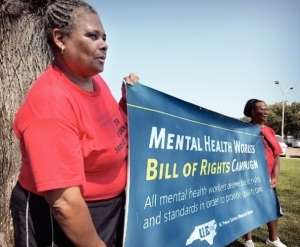Cherry employees protest hospital working conditions
By Matthew Whittle
Published in News on September 15, 2011 1:46 PM

News-Argus/MICHAEL K. DAKOTA
Larcene Taylor and Peggy Evans protest what they say are dangerous and unfair working conditions at Cherry Hospital during a rally Wednesday at the mental hospital.

News-Argus/MICHAEL K. DAKOTA
Construction on the new Cherry Hospital is about half complete and is expected to wrap up in December 2012, with the facility ready for patients by the spring of 2013. State officials say the new facility will be state-of-the-art and with a new leadership team in place, both patient and working conditions should be much improved.
A small but vocal group of Cherry Hospital health care technicians attempted to make their voices heard Wednesday afternoon, holding a rally to protest what they feel are unsafe and unfair working conditions.
Their complaints, which center around dangerous working conditions, mandatory overtime and an unfair grievance process, are similar to those voiced by nurses at the hospital in recent years.
"We love our patients. The patients come first with us. But this is a stressful job. We're the ones, one-on-one with the patients, getting hit, kicked and spit on, bones broken, and management just sits in their offices. If this is a team -- that's what they told us at the town hall meeting -- then everybody should be part of the team," said Jeanie Marcell, a 13-year health care tech.
*
In 2010, several nurses spoke out about what they saw as dangerous working conditions after a number of employees were injured during assaults by patients. At that time, state officials said they were still in the process of changing to a new intervention technique and that as they continued to train and educate employees, those numbers should improve. Former director Philip Cook, who resigned his position on Aug. 31, also said that more staff were needed.
And now, the numbers do seem to be bearing those predictions out.
For the first six months of 2010, there were 239 staff injuries caused by patient aggression -- the worst of the state's psychiatric hospitals. For the first six months of 2011, there were 94 staff injuries caused by patient aggression -- the fewest of any state psychiatric hospital, though six of those incidents resulted in trips to the emergency room, the most in the state.
Some of the high number in 2010, state officials said then, could be attributed to an unusually high number of unusually aggressive patients, but earlier this month, in an interview at the site of the new Cherry Hospital, Director of State Operated Health Care Facilities and acting Cherry Director Luckey Welsh said much of the drop since then was due to improved staff training.
Since last year, he explained, more funding and attention has been given to staff education and training about how to de-escalate and deal with aggressive patient behaviors.
"I think we're better educated and trained how to handle these patients than we were two years ago and that's been a big difference," Welsh said, pointing out the fact the hospital recently had its national accreditations renewed.
State officials also said they've worked to make sure all front-line staff have body alarms and whistles to call for help when situations do occur. However, staff have complained that the alarms do not always work -- that there are many false alarms or the alarms don't always correspond to where the employee is -- and that whistles cannot be heard outside of the units they're being used on. State officials, while not disputing these concerns, said they do not track how often such failures occur.
However, they did say they are looking at psychiatric hospitals across the nation for alternative alarm systems to install in the new hospital.
"There are no fail-safe systems," state Department of Health and Human Services Director Lanier Cansler said. "But we will do everything we can to make sure our staff are safe."
The real key to keeping people safe, though, he said, will be to continue to their education and training efforts.
"That is the most important thing of all," Cansler said.
*
However, nurses say they don't really feel safer at the hospital, despite the drop in injuries.
"Numbers wise, it does look better," said one nurse, speaking on the condition of anonymity because he says he is scared for his job. "But I don't think it's any safer. I don't think people feel any safer."
The nurse did acknowledge, though, that the training has worked to some degree, all but eliminating patient injuries from staff actions.
"You are certainly not seeing any staff hurting patients," the nurse said.
Still, among the nurse's concerns, are the number of House Bill 95 patients -- those who have been in the state's criminal justice system and who are often violent -- the inability of staff to rely on Cherry Hospital Police for help in dealing with violent patients, and the shortage of front-line staff, which can create less-than-ideal and even unsafe ratios of nurses and health care techs to patients.
In terms of the second issue about Cherry police, state officials reiterated what they said last year -- that the hospital's police force is there to protect the campus, not to intervene in patient care on wards. And while other state psychiatric hospitals in South Carolina and Virginia do allow their security forces to assist, they are only allowed to do so using the same least restrictive intervention techniques as the health care staff. Other private psychiatric hospitals in North Carolina do not allow security staffs onto the wards.
But, hospital staff said, it is the staffing issue that is the biggest concern because it also relates to the mandatory overtime problem.
The concern, the nurse explained, is that despite the N.C. Board of Nursing's recommendations against mandatory overtime policies and its stance that refusal by nurses to stay over should not be considered patient abandonment, the hospital holds it against them.
"Refusal to stay on duty after being instructed to do so will be considered insubordination, which is a personal conduct issue, and may result in disciplinary action up to and including dismissal," reads the policy, which state officials said is uniform for all facilities.
"Refusal to remain on duty when instructed to do also jeopardizes patient care and safety, causing additional hardship on other employees, and constitutes abandonment of duty," reads a memo explaining the policy from Teris Webb, chief nursing officer.
However, the nurse said, the real issue with safety and patient care comes when nursing staff is required to remain at work longer than a traditional shift, especially if employees are sleep deprived.
"It's not just bad for the staff, it's bad for the patient," the nurse said.
But, said Renee McCoy, spokeswoman for DHHS, not only does the Fair Labor Standards Act not limit the number of hours an employee may be required to work, the mandatory overtime policy exists because "as a state agency charged with the care, safety and treatment of patients in our facilities, maintaining minimal staffing levels is an essential function of operation as required by the feds; it is a mandate by law."
And according to the policy, which is called "emergency support scheduling" and utilizes a system of red dots that are placed on an employees' monthly schedules on days they might be required to work overtime, every effort is to be made to find on-duty nursing staff, whether from another ward of building, or volunteers to cover these times when additional staff are needed. The policy also states that dots are not assigned if employees are coming off a 12-hour shift.
However, the health care techs said Wednesday, not only do they feel the red dots are not equally distributed among all the employees, but they wonder why the administrative staff isn't doing more to address those staffing shortages if they know a month ahead of time that they exist.
"Neglect starts with management," Ms. Marcell said. "If they know they have these shortages, then they should be working on that."
And with more than $2.08 million spent in overtime in the first six months of this year -- compared to nearly $4.23 million in the first six months of 2010 -- state officials say they realize there is a problem, and that they are working to hire about 30 more front-line nursing staff members.
"We are staffing now at a level that is not of an ideal level of staffing," Cansler said.
In addition, he explained, all of the state's psychiatric facilities will be participating in a new accounting/financial management analysis program they hope will help identify where things are being done well and where things need to be improved -- including in terms of staffing levels -- and they hope to have the first results of that effort available in early October.
"As we become more efficient, we will have money we can reinvest," he said.
*
But, he said, even with those internal savings, the biggest obstacle to improving conditions at Cherry and the state's other hospitals will be maintaining the mental health system's funding streams.
"We can't spend money we don't have," Cansler said.
That aside, though, Cansler and Welsh say they are convinced that with the new administrative team -- and a new director search under way -- Cherry is on the right track, and that by the time the new facility opens in the spring of 2013, the change in Cherry's culture will be complete.
"Philip Cook in his time made a big difference, changing the culture here, and I think most of the staff supports that. They're proud to work here because they see what we're doing. And we want to make sure whoever we bring in is the right person and will continue the progress we've been making," Cansler said. "This is going to be a state of the art facility. It's exciting."
*
In the meantime, though, the small group of health care techs protesting Wednesday, all members of the local UE 150 union, are working with the NAACP and other civil rights and faith-based groups, as well as Rep. Larry Bell, D-Sampson, to push a solution through the state legislature -- a Mental Health Workers Bill of Rights, which calls for a right to a safe workplace, right to adequate staffing, right to refuse overtime, right to a fair grievance process, right to receive timely patient briefings and a right to collective bargaining.
"This is in support of that campaign," said rally organizer Larcene Taylor, a 19-year health care tech. "We want to support that bill and see it made law."
And while the protesters said many of the employees who support the bill were hesitant to protest because of fear for their jobs, they plan to keep pushing.
"We may be few in number, but we're going to keep rallying. It's time to make a stand. We're mad and somebody's got to help us," said Janice, a 10-year health care tech.
